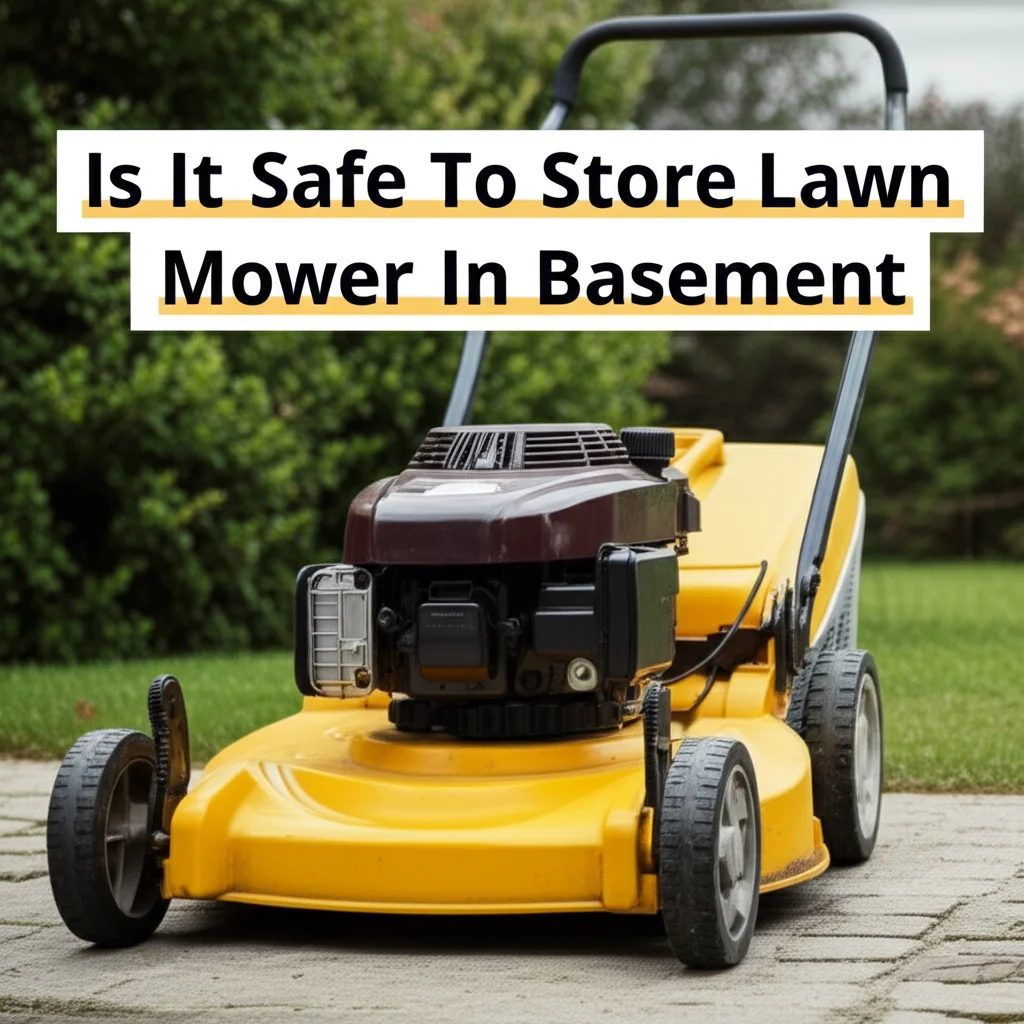· Home & Garden · 6 min read
Is It Safe To Store Lawn Mower In Basement

Is Storing Your Lawn Mower in the Basement a Good Idea?
Have you ever wondered if your basement is a suitable storage spot for your lawn mower? It’s a common question for homeowners, especially those with limited garage or shed space. Storing your lawn mower in the basement can be safe, but it requires careful consideration and adherence to specific safety guidelines. This article will explore the potential risks, necessary precautions, and alternative storage options to help you make the best decision for your home and family. We’ll cover everything from gas and fumes to proper cleaning and maintenance before storage.
Takeaway:
- Always disconnect the spark plug on gas mowers.
- Drain all fuel or stabilize it with a fuel stabilizer.
- Thoroughly clean the mower deck before storage.
- Ensure adequate ventilation in the basement.
- Consider alternative storage options if safety concerns are significant.
Is it safe to store a lawn mower in the basement? Generally, it’s possible, but with significant precautions. Gas-powered mowers pose the biggest risk due to flammable fuel and potential carbon monoxide buildup. Electric mowers are safer, but still require careful storage to prevent accidents and maintain functionality.
The Risks of Basement Lawn Mower Storage
Storing a lawn mower in your basement isn’t without its potential dangers. Understanding these risks is the first step toward safe storage. The primary concern revolves around gasoline-powered mowers and the flammable nature of fuel. Gasoline vapors can accumulate, creating a fire or explosion hazard, especially near a water heater or furnace. Beyond flammability, improper storage can also lead to carbon monoxide buildup, a silent and deadly threat.
- Flammable Fuels: Gasoline and oil are highly flammable and can ignite with a spark.
- Carbon Monoxide: Running or recently run gas engines produce carbon monoxide.
- Moisture & Rust: Basements can be damp, leading to rust and corrosion of mower parts.
- Pest Attraction: Residue on the mower can attract pests like rodents.
Gas vs. Electric Lawn Mowers: A Safety Comparison
The type of lawn mower you have significantly impacts the safety of basement storage. Gas-powered mowers present a higher risk profile than electric models. Gas mowers require extra steps to mitigate the dangers of flammable fuel and potential carbon monoxide emissions. Electric mowers, whether corded or battery-powered, eliminate the fuel risk, making them a safer option for basement storage. However, even electric mowers require precautions to prevent electrical hazards and maintain battery health.
- Gas Mowers: Higher fire risk, carbon monoxide potential, require fuel draining/stabilization.
- Electric Mowers: Lower fire risk, no carbon monoxide, but still require battery care and protection from moisture.
- Battery-Powered Mowers: Require proper battery storage to maintain lifespan and prevent leaks.
Preparing Your Lawn Mower for Basement Storage
Proper preparation is crucial for safe basement storage, regardless of the mower type. Before bringing your lawn mower into the basement, you need to take several steps to minimize risks. First, and most importantly, disconnect the spark plug wire on gas-powered mowers to prevent accidental starting. Next, drain all gasoline from the fuel tank and carburetor, or use a fuel stabilizer to prevent fuel degradation. Thoroughly clean the mower deck to remove grass clippings and debris, which can attract pests and contribute to corrosion. https://beacleaner.com/how-to-clean-lawn-mower provides a detailed guide on cleaning your lawn mower.
- Disconnect Spark Plug: Prevents accidental starting (gas mowers).
- Drain or Stabilize Fuel: Eliminates flammable fuel vapors (gas mowers).
- Clean Mower Deck: Removes debris and prevents corrosion.
- Oil Change: Fresh oil protects the engine during storage.
Ensuring Adequate Ventilation in Your Basement
Ventilation is paramount when storing a lawn mower in the basement, especially a gas-powered one. Even after draining the fuel, residual vapors can linger. Good ventilation helps dissipate any potential fumes and prevents the buildup of carbon monoxide. Open windows and use fans to circulate air, especially during and after moving the mower in or out of the basement. Consider installing a carbon monoxide detector in the basement for added safety. https://beacleaner.com/how-to-clean-basement can help you ensure your basement is generally clean and well-maintained, contributing to better air quality.
- Open Windows: Allows for natural airflow.
- Use Fans: Circulates air and helps dissipate fumes.
- Carbon Monoxide Detector: Provides an early warning of dangerous CO levels.
- Avoid Storing Near Furnaces/Water Heaters: These appliances can ignite fuel vapors.
Alternative Lawn Mower Storage Options
If you’re concerned about the safety risks of storing your lawn mower in the basement, several alternative options are available. A well-secured shed is an excellent choice, providing dedicated storage space away from your living areas. Garages are ideal, but if space is limited, consider a covered outdoor storage area with a waterproof tarp. If you lack any of these options, explore renting a storage unit specifically designed for outdoor equipment. Remember to prioritize safety and choose the option that best suits your needs and circumstances.
- Shed: Dedicated, secure storage space.
- Garage: Ideal if space allows.
- Covered Outdoor Storage: Use a waterproof tarp for protection.
- Storage Unit: Rent a unit specifically for outdoor equipment.
Frequently Asked Questions
Q: Can I store a gas lawn mower in my basement if I drain the fuel? A: Yes, draining the fuel significantly reduces the risk, but it’s still crucial to disconnect the spark plug, thoroughly clean the mower, and ensure adequate ventilation. Residual fumes can still pose a hazard.
Q: Is it safe to store a battery-powered lawn mower in the basement? A: Generally, yes. Battery-powered mowers eliminate the fuel risk. However, store the battery in a cool, dry place and follow the manufacturer’s instructions for long-term storage.
Q: How can I prevent rust when storing my lawn mower in the basement? A: Thoroughly clean and dry the mower before storage. Apply a rust preventative spray to metal parts. Consider using a dehumidifier in the basement to reduce moisture levels.
Q: What should I do if I smell gas in my basement? A: Immediately ventilate the area by opening windows and doors. Do not operate any electrical switches or appliances that could create a spark. Contact your local fire department or gas company.
Q: Should I cover my lawn mower while storing it in the basement? A: Yes, covering the mower with a tarp or sheet will protect it from dust and debris.
Conclusion
Storing your lawn mower in the basement can be a convenient solution, but it’s essential to prioritize safety. While electric mowers pose fewer risks, gas-powered mowers require meticulous preparation and a well-ventilated storage area. Remember to disconnect the spark plug, drain or stabilize the fuel, and thoroughly clean the mower before storing it. If you have any doubts about the safety of basement storage, consider alternative options like a shed, garage, or storage unit. Ultimately, making an informed decision and taking the necessary precautions will ensure a safe and worry-free storage experience. https://beacleaner.com/how-to-clean-air-filter-on-lawn-mower will help you maintain your mower for optimal performance and safe storage.
- lawn mower storage
- basement storage
- gas lawn mower
- safety
- home maintenance




